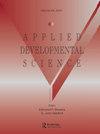制定成熟在青春期:扩展理论,发展一种措施,并考虑问题行为的影响
IF 1.5
3区 心理学
Q3 PSYCHOLOGY, DEVELOPMENTAL
引用次数: 1
摘要
青少年早期面临的一个挑战是,青少年对自主的需求与缺乏通过成人角色实现成熟的机会之间存在“发育不匹配”。我们通过焦点小组(N = 41, 11-17岁)从年轻人的角度确定了年轻人制定成熟的方式,并使用数据开发和测试了一种新的制定成熟(EM)的方法,使用在线调查(N = 420;11-18岁;58.6%的女性;49.5%的白人)。探索性因子分析发现,四个内部一致的因子为:独立性、责任感、领导力和沟通能力;验证性因子分析得出21项量表,模型拟合良好。独立性与更多的物质使用和一般风险承担相关,而责任和沟通与较少的物质使用和一般风险承担相关。EM措施是了解青少年是否有机会实现成熟以及这与关键发展结果之间的关系的重要的第一步。本文章由计算机程序翻译,如有差异,请以英文原文为准。
Enacting maturity during adolescence: Extending theory, developing a measure, and considering implications for problem behaviors
Abstract A challenge of early adolescence is the “developmental mismatch” between adolescents’ need for autonomy and the lack of opportunities to enact maturity via adult-like roles. We identified ways that young people enact maturity, from a youth perspective via focus groups (N = 41, aged 11–17 years), and used data to develop and test a new measure of enacting maturity (EM) using an online survey (N = 420; aged 11–18 years; 58.6% female; 49.5% White). Exploratory factor analysis suggested four internally consistent factors: Independence, Responsibility, Leadership, and Communication; confirmatory factor analysis resulted in a 21-item scale with adequate model fit. Independence was associated with more substance use and general risk taking while Responsibility and Communication were associated with less substance use and general risk taking. The EM measure is an important first step to understanding if adolescents have opportunities to enact maturity and how this relates to key developmental outcomes.
求助全文
通过发布文献求助,成功后即可免费获取论文全文。
去求助
来源期刊

Applied Developmental Science
PSYCHOLOGY, DEVELOPMENTAL-
CiteScore
12.00
自引率
2.60%
发文量
23
期刊介绍:
The focus of this multidisciplinary journal is the synthesis of research and application to promote positive development across the life span and across the globe. The journal publishes research that generates descriptive and explanatory knowledge about dynamic and reciprocal person-environment interactions essential to informed public dialogue, social policy, and preventive and development optimizing interventions. This includes research relevant to the development of individuals and social systems across the life span -- including the wide range of familial, biological, societal, cultural, physical, ecological, political and historical settings of human development.
 求助内容:
求助内容: 应助结果提醒方式:
应助结果提醒方式:


